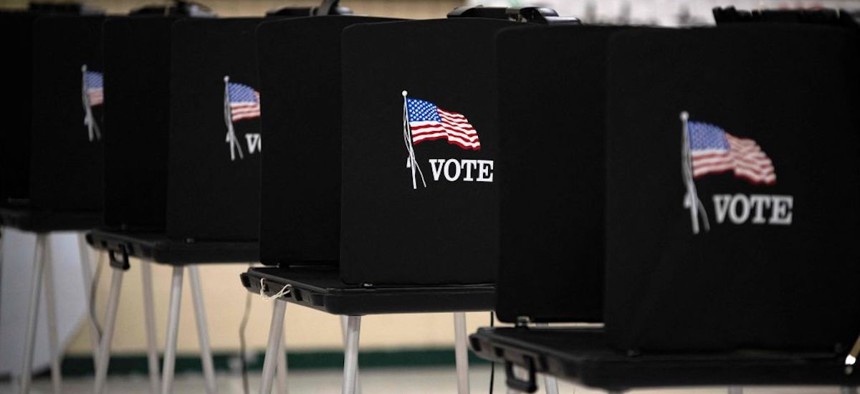Connecting state and local government leaders
The mandate they approved in 2021 will force counties to replace their election machines at a cost of more than $100 million — and to keep replacing them. One Senate bill to address the problem is moving ahead.
Texas lawmakers are trying to undo an expensive election problem they didn’t realize they had created in the first place.
In 2021, they passed a law that is set to require counties to purchase vote-counting equipment that does not yet exist and that would cost taxpayers more than $100 million. The measure, when it was proposed, went unnoticed and passed on a voice vote without debate.
After Votebeat reported in February on the unprecedented problem with the law and election officials’ deep concerns, state Sen. Bryan Hughes, a Republican, and other lawmakers filed legislation to ease the conundrum the measure had forced on Texas counties, which would be prohibited from using their current vote-counting equipment and required to purchase new equipment each election. Hughes said during a committee hearing last month that there had been a “misunderstanding on the scope” of the provision.
Hughes’ new proposal, Senate Bill 1661, would amend the language of that law to allow counties to continue to use the voting equipment they have without any additional costs to counties or taxpayers.
“When this became law, the hope was that it would get fixed this session, and we’re glad to see it’s getting addressed,” said Chris Davis, the Williamson County elections administrator. “We’re glad [lawmakers] recognize their mistake.”
Passed as part of the sweeping voting law known as Senate Bill 1 in 2021, this particular measure was proposed by Sen. Bob Hall and supported by Hughes, the voting bill’s author. Both legislators at the time said the provision would prevent “cheating” and the “manipulation” of vote data stored in USB flash drives and taken from polling places to central counting stations — although there’s no evidence such malfeasance happened.
The law requires the use of equipment in which data “once written, cannot be modified.” That prohibits counties from using reusable storage devices, such as the USB flash drives, which are certified by the secretary of state. That requirement also prohibits the use of equipment such as ballot scanners and tabulating machines, all now used to count votes. The technology the law demands instead is often referred to as WORM, which stands for “write once, read many,” and generally refers to CD or DVD drives and the discs they burn data onto.
Votebeat reported that when the law takes effect in September 2026, in order to fully comply with it, counties will have to buy entirely new voting systems for each election, since the whole point is that the equipment can’t be reused. The secretary of state’s office estimates it will cost taxpayers more than $116 million to replace the eliminated equipment, plus an ongoing cost of more than $37 million every two years, since new equipment would have to be purchased for each election.
And that’s only if counties are able to find such equipment. Voting equipment that would match the requirements does not appear to have been invented by any election equipment company operating in the United States.
“I hope [legislators] review this and understand how much of an expense this is for counties and how much work it is for [election administrators],” said Terri Jordan, Angelina County elections administrator. Jordan added that if lawmakers have questions about the equipment, “they can come watch how we test the voting machines for accuracy. They can come see how it works. But they haven’t shown up.”
Hughes’ new proposal requires that counties use storage devices, such as the secretary of state-certified USB flash drives, that, if manipulated or tampered with, would become unreadable once they’re entered into the tabulating machines used to count votes. This is equipment counties already have accessible.
Baseless claims of widespread voter fraud in Texas and across the country after the 2020 election fueled legislation focused on specific and previously obscure aspects of election administration, such as the security of voting equipment.
Some experts say that if lawmakers keep writing technology into law, as they did with this provision of Senate Bill 1, they’ll likely find themselves amending the same provisions often, as technology keeps evolving and some of it becomes obsolete. These types of requirements belong not in legislation but in regulation, said Dan Wallach, a computer science professor at Rice University whose research includes electronic voting system security.
If the concern is voting equipment security, “the Legislature should direct the [secretary of state] to take steps to improve security and empower them to issue regulations in consultation with experts,” Wallach said. “I don’t know why the Legislature is getting this deep into the weeds. This level of specificity in the law seems brittle.”
Hughes’ bill was voted out of the Senate State Affairs Committee late last month and is likely to pass on a vote of the full Senate. The bill would still need approval from the House before becoming law.
Several other lawmakers also filed bills seeking to address this provision of Senate Bill 1, but those bills have yet to get committee hearings and are likely to stall.
None of the bills, including Hughes’, simply remove the WORM provision from the law. Rather, the bills seek to modify the language. That’s because, some experts say, lawmakers are using the bills to make a partisan and ideological point: that there’s cheating in elections and that changes must be made to “squeeze the corruption and dishonesty out of elections and make them pure,” said Cal Jillson, political science professor at Southern Methodist University.
“They tried to make that point with language that has now been shown to be impossible to implement, but they still have to make that point now,” Jillson said.
This article was originally published by Votebeat, a nonprofit news organization covering local election administration and voting access. Sign up for their newsletters here.



